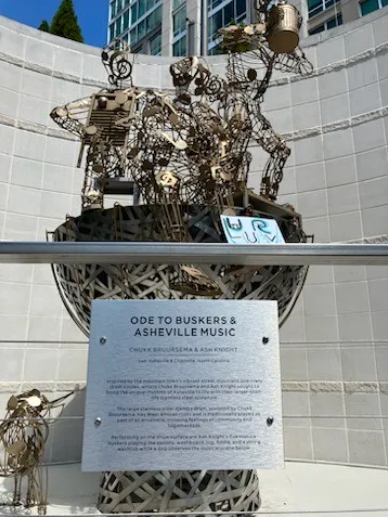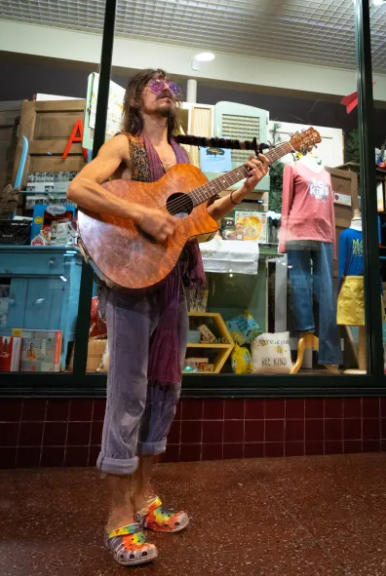By John Reinan, avlwatchdog.org
Asheville loves its buskers so much that there’s a sculpture in the heart of downtown dedicated to street musicians.
But the buskers aren’t sure how much they love Asheville. Traveling buskers who once made regular stops here are no longer coming. Rising housing costs have made it tough for street performers to find a place to live near downtown.
The COVID pandemic brought diners onto the sidewalks and took away prime busking spots. And aggressive panhandlers, some buskers say, interfere with performances and scare away the audience.
It’s all led to a big drop in the number of street performers.
“I have noticed a dramatic loss of buskers in this town,” said Lyle Rickards, a leader of the Asheville Buskers Collective, a loose-knit group of some 300 street performers. “This year, I’d say there are 30 buskers in town for the season. Last year, we had 100.”
One musician who no longer performs in Asheville is Abby Roach, the legendary “Spoon Lady,” who returned to her native Kansas several years ago.
“There used to be a lot more bands coming out – three-, four-, five-piece bands,” Roach said. “A lot of the big bands don’t quite come out anymore. You have a lot of folks who have just kind of given up on street music.”
The world of street performance is “fragile,” said Andrew Fletcher, a longtime busker and community activist, and right now it’s damaged here.
“[Busking] exists when so many other things are going right and in balance,” Fletcher said. “Those factors changed in Asheville.”
No place to live
Buskers are often reluctant to reveal their income, but many performers say they make enough to live modestly. Several buskers said it can be more lucrative than playing in bars – which is a low bar to clear, they added.
“This has been my full-time living for 10 years. I pay rent, I pay taxes. I do well,” Rickards said. But with home prices and rents rising rapidly in Asheville, he said, it’s tough to find a place to live on a street performer’s income. Meanwhile, many buskers’ income is half what it once was.
“Half of us live in our cars,” Rickards said. “And we live farther out, because we can’t afford to live in Asheville. We are being marginalized.”
Housing prices drove the Spoon Lady out of Asheville. Roach said she was able to buy a 2,000-square-foot house near Wichita, Kansas, for $50,000.
“Airbnb is kind of taking over any place that rents,” she said. “It’s kind of become a huge issue.” Some performers have gone to San Diego or New Orleans, she said. Other former regulars have moved across the Tennessee or South Carolina state lines, where housing is cheaper, and now come here only occasionally.
“The places near downtown are no longer there for people at the level of a performing income,” Fletcher said. “They’ve been replaced by people with more money.

“This is the story of gentrification. Artists make a place cool, and then when it’s cool, they can’t afford it anymore.”
The COVID pandemic also affected the buskers. Downtown restaurants received permission to create sidewalk seating areas and “parklets” at curbside. That ate up sidewalk space once used by buskers.
“We’ve lost a lot of ground in Asheville,” Rickards said. “When hotels are built, we lose sidewalks. Since COVID, a lot of tables have been put outside; parklets have been authorized outside. And they still have that outdoor seating.”
Roach finds it highly ironic that the busker sculpture on Hotel Arras property at the corner of Lexington and Patton Avenues took over a prime corner where busker bands once played.
“Somebody tagged that on social media as the Spoon Lady, and my head about popped off,” she said. “I felt I was used as hostile architecture.”
Problems with panhandlers
One sure way to raise the hackles of a busker is to compare them with panhandlers.
“It is an issue,” said a busker named Skyfox, who’s been performing downtown for several years and also works a retail job. “Not everyone knows the difference.
“So a person sees me, and there’s [a panhandler] next to me, and they lump us together: ‘Oh, those are both people asking me for money.’ I get treated in a way that’s less than respectful. I’ve been honing my craft for 10 years.
“A lot of times there are people acting crazy, and it ruins the vibe for everybody.”
The panhandling problem has gotten worse in recent years, said Rickards. He’s been mugged several times, he said, and has to ward off aggressive panhandlers almost every time he plays.
“Panhandling has interfered with my busking in the last year and a half more than it ever has,” he said. “This city has been gracious to us, to allow us to do this. And we in turn have our code of conduct. And we’re put in the same class as panhandlers. That’s an insult.”
“Panhandlers can make buskers look bad,” Fletcher said. “When there’s a lot of panhandling going on, a panhandler can kind of make you look like a panhandling musician.
“[But] there’s no comparison. There’s no overlap between panhandling and busking. They are completely separate activities that unfortunately share protection under the First Amendment. The panhandling issue is just a symptom of inequality in our society.”
Rickards is skeptical of current proposals to crack down on panhandling, especially along roadways and highway medians.
“If they stop the median panhandling, guess where they’re all gonna end up?” he said. “They’re all gonna end up in the center of town. That’s a bad idea.”
City: ‘We love and appreciate’ the buskers
The city realizes the issues buskers face and is sympathetic, said Dana Frankel, Asheville’s downtown projects manager.
“The city values our street performers and busking community very much,” Frankel said. “We recognize that in other cities, this is an activity people are trying to have.”

Frankel said she often gets calls from officials in other areas asking what they can do to encourage busking.
The city must balance many factors in managing the downtown area, she said. Safety requires that sidewalks and streets be kept open for passage. Restaurants and hotels want to best serve their patrons.
“The other uses of public space 100% conflict [with busking], and we try to do our best to manage that,” Frankel said. “We’re constantly looking for opportunities to get multiple wins for how our public space is utilized.”
The city maintains a hands-off policy with buskers, arising out of an episode about 10 years ago when officials proposed tighter regulations on busking, including designated spaces for busking and requiring buskers to wear a photo ID on a lanyard.
The Buskers Collective was formed in response, and the city agreed to let the buskers govern themselves under a code of conduct the group developed. Frankel said she thinks the system works well.
“Every time the city has kind of explored having a more active role in management, we tend to get pushback from the busking community,” she said. “And so we’ve kind of remained hands-off. We don’t want to interfere with something that’s working.”
In the coming years, she said, there will be more sidewalk space in downtown as projects get built out. The Flat Iron building, long a popular busking spot, is getting additional sidewalk area as part of its conversion to a hotel. The city is also exploring incentives for restaurants if they move their tables and chairs off the sidewalk during non-business hours.
“We want to be as supportive as possible while balancing the other needs our community has, and the demand for use of public space,” Frankel said. “We love [buskers] and appreciate them.”
Fletcher, who busks occasionally but mainly plays now in traditional venues, fondly recalled performing on Asheville streets in the ‘teens’ with Big Nasty, a New Orleans-style jazz band that was once a regular but no longer plays here.
“We didn’t know it at the time,” he said, “but that was sort of the golden age.”
Asheville Watchdog is a nonprofit news team producing stories that matter to Asheville and Buncombe County. John Reinan was a reporter for seven newspapers from Alaska to Florida. He was part of a team awarded the Pulitzer Prize for breaking news coverage at the Minneapolis Star Tribune. Email jreinan@avlwatchdog.org. To show your support for this vital public service go to avlwatchdog.org/donate.




One important change in Asheville busking which would have been good to address is the trend toward more, bigger, & louder amplification used by a growing number of buskers. Traditional buskers attract groups of listeners with their talents, provide a mini-show, and receive tips from those who paused to listen. They are adept at drawing listeners in to them. Most of the amplified buskers are not drawing people in, but rather are loudly “broadcasting” over a much more expansive area, and end up playing to a largely captive audience, whether many wish to hear it or not – including those in offices, residences, and businesses. The City’s “hands off” attitude is concerning in the face of this development, and the Busker’s Collective might do well to consider some limits on amplification. Leaving it to a weak and unenforced noise ordinance does not suffice.
I agree. I will never give a dime to an amplified busker. They should be run out of town.
I miss the buskers so much. When we moved here in 2010. I went downtown all the time. The buskers were part of the “energy” of downtown that I loved. Now I rarely go downtown. It’s becoming more mundane every year.
An art piece downtown devoted to buskers, in place of actual buskers? Who could have foreseen such irony? https://mountainx.com/opinion/new-busking-regulation-proposals/
The panhandlers have reduced ventures onto the streets of downtown by folks with the means to contribute to the buskers.
Never drop any money in the case of amplified music buskers.